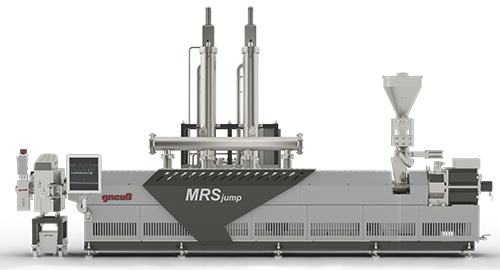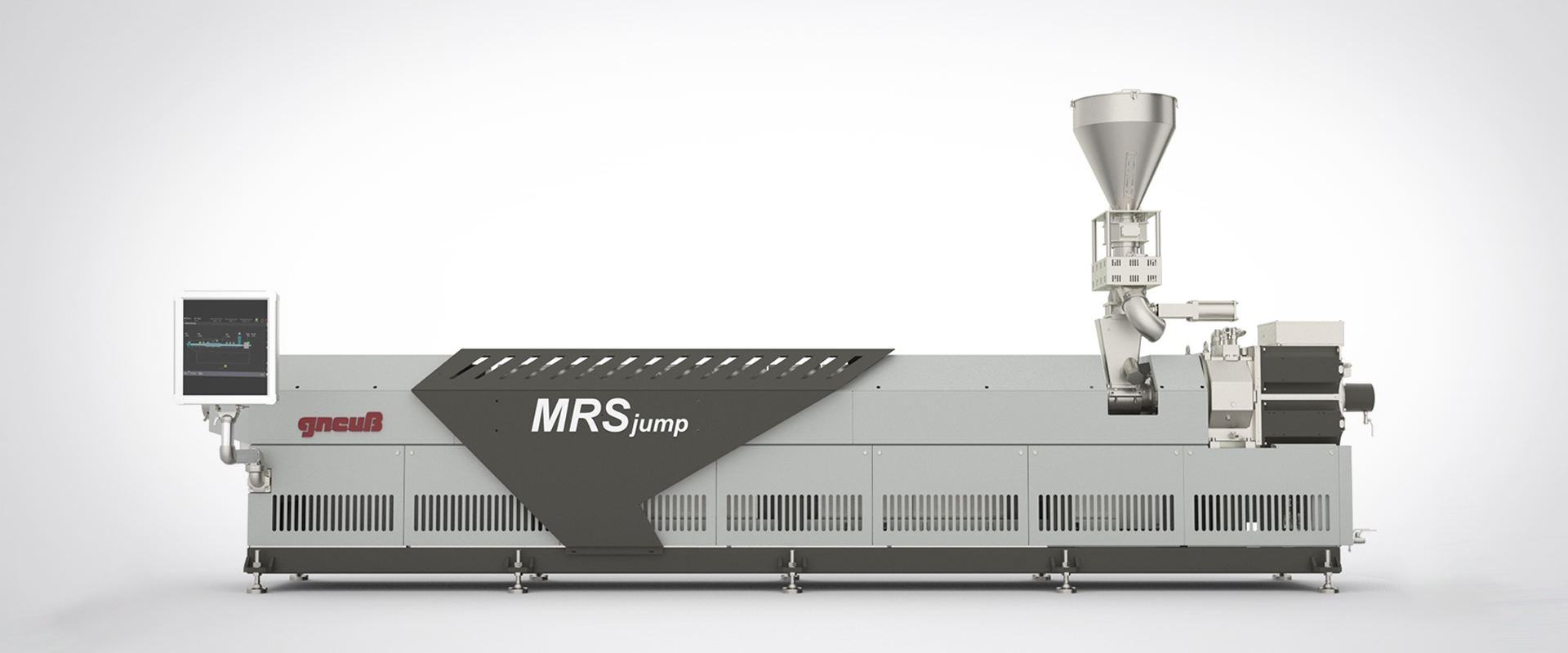MRSjump extrusion process
The MRSjump extrusion process is based on Gneuss’ MRS (Multi-Rotation-System) extrusion principle. The MRS extruder is an advancement of a simple single screw extruder, equipped with a multi screw section for optimum devolatilization. The unique MRS technology enables extremely efficient and gentle decontamination of PET, without the need for pre-drying whilst achieving the required decontamination for food contact standards.
Design
What is new about the MRSjump is the longer, modified version of the Multi Rotation Section which ensures both a longer residence time of the material and surface area exchange under vacuum. At the same time, material shearing has been reduced. As the thermal and mechanical stress on the polymer melt is minimised, PET processed on the MRSjump extruder has excellent optical and mechanical properties.
IV stabilization at target level

The longer Multi Rotation Section, coupled with a powerful vacuum system with 1 mbar can be used to boost the viscosity of R-PET and to hold it at a stable level in spite of variations in the input material. In this way, there is no need for any liquid phase (LSP) or solid state polymerisation (SSP) for many applications.
With the stabilisation and/or increase of the intrinsic viscosity in the extrusion process, the MRSjump is especially well suited to recycling for example reground PET film waste or fiber recycling – cases in which direct recycling with an extruder was previously impossible due to the too low intrinsic viscosity or variable input viscosities.
| MRSjump Extruder | throughput rate | ||
| PET | 35 – 2.000 kg/h | ||
| PP + PE | 25 – 1.600 kg/h | ||
| PA | 28 – 1.900 kg/h | ||
| PS | 39 – 1.500 kg/h |
Advantages of the MRSjump extruder:
- IV retention and boost
The MRSjump extruder can stabilise and/or increase the IV of the PET in the melt phase, in the extruder itself. - No pre- or post-extrusion treatment
The MRSjump extrusion process avoids the need for both pre-treatment and post-treatment of the PET, whether by Liquid State (LSP) or Solid Sate Polymerisation (SSP). - Low thermal and mechanical stress on the material
Thanks to the shortest possible processing chain, the PET stays in a narrow, defined residence time spectrum. The thermal and mechanical load on the PET is maintained as low as absolutely possible. This results in excellent mechanical and optical product properties. - Compact design
The footprint of the MRSjump extruder is not significantly longer than that of a conventional extruder. The MRSjump extruder requires little space, is low maintenance and extremely energy efficient. - Worldwide PET food contact compliancy
The high devolatilising performance of the MRSjump extruder means that it achieves the challenge test requirements of the FDA, EFSA and many other local regulators worldwide. And this without the need for cost and energy-intensive treatment of the material prior to or after extrusion. - Wide range of input materials
The MRSjump can easily handle recycled PET in a wide range of forms, whether as post-consumer PET bottle flake or reground sheet (including post-consumer), fibre waste or in a combination of different forms.
News
Unique PET tray-to-tray recycling in a single extrusion step
For this demanding process of tray-to-tray recycling, Gneuss has developed the innovative MRSjump Extruder with which it is possible to process post-consumer PET regrind from thermoformed trays directly to sheet for thermoforming trays in one step.
Do you need more detailed information? Request our technical reports and brochures now!
Request